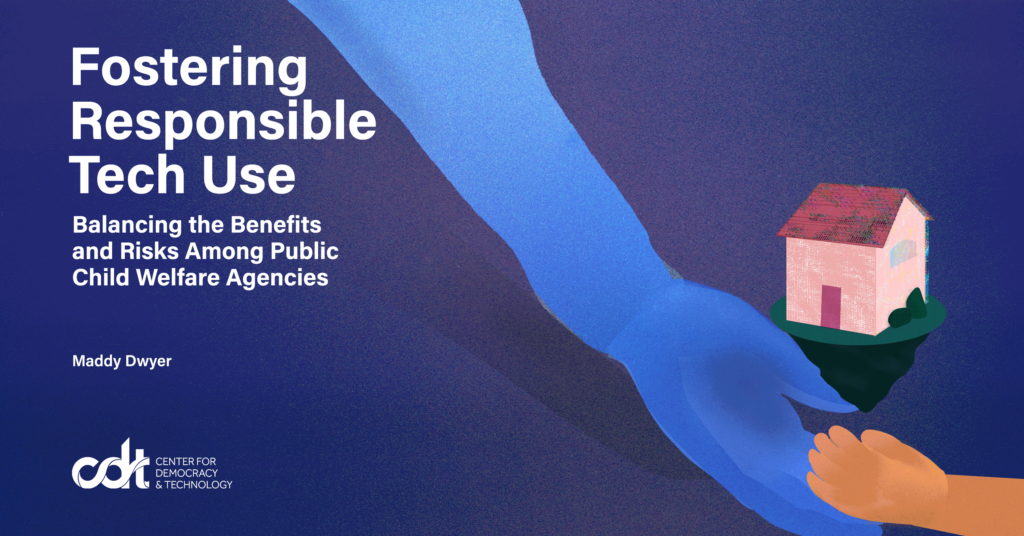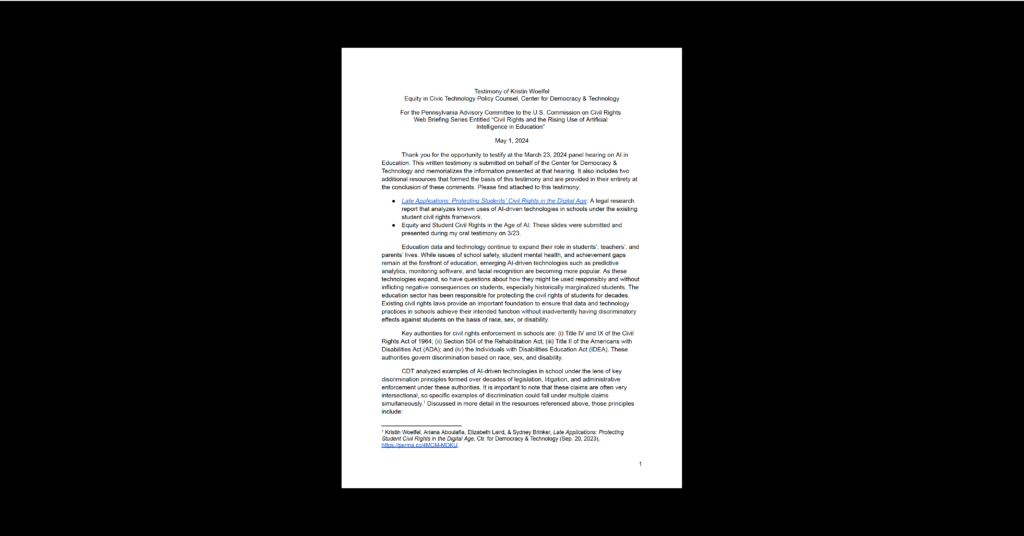Equity in Civic Technology Project: FAQs

The Equity in Civic Technology Project was launched by the Center for Democracy & Technology (CDT) in the spring of 2021 and reflects CDT’s commitment to advancing just, fair, and responsible use of technologies.
Below, we discuss the goals of this new program and the strategies we will use to achieve them.
What does the Equity in Civic Technology (Civic Tech) Project hope to achieve?
Our vision is that fair and equitable governance is essential to a thriving democracy. We believe this can be achieved, in part, by supporting the responsible use of data and technology to improve outcomes for individuals and the public good while ensuring it does not come at the expense of privacy and individual rights.
Our mission is to advance privacy-forward policies and practices that promote the equitable and responsible use of data and technology by public agencies.
What does the equitable and responsible use of data and technology mean?
It means they:
- are used to help individuals and promote the public good;
- center equity, both in terms of minimizing harm and unintended consequences to individuals, especially the most vulnerable, as well as ensuring the benefits of data and technology are available to all, not just a select few;
- protect privacy and respect individual dignity and autonomy; and
- reflect the needs and concerns of the public and the community in decision-making.
How will the Equity in Civic Technology Project achieve its goals?
We aim to:
- provide balanced advocacy that promotes the responsible use of data and technology while protecting the privacy and civil rights of individuals;
- create solutions-oriented policy resources and technical guidance that are grounded in the problems that currently confront policymakers and civil servants as well as the technology providers who work with them; and
- conduct timely research that can bring discipline and facts to debates about practices and policies in the emerging field of responsible data use by public agencies.
Why was the Equity in Civic Technology Project created?
To help public agencies meet the needs of individuals and promote the common good. Just as data and technology have transformed many aspects of our lives, the same potential exists to revolutionize government to better serve individuals. In particular, data and technology can benefit individuals and the public good in multiple ways, such as:
Benefiting Individuals
- Service coordination: Public agencies are often siloed, even when serving the same individuals. Sharing data across sectors can help agencies coordinate their services by reducing burdens on individuals and improving services. For example, limited and responsible data sharing can provide access to a foster child’s education record that allows a case worker to coordinate services and support for foster children and families as well as children experiencing abuse and neglect.
- Targeting support and services: Public agencies struggle with targeting support and services, especially to those who need them the most and might be the hardest to reach. For example, analyzing and providing individual-level data can assist job seekers if they receive tailored information on opportunities, training, and education that are available to them, which can lead to secure and steady employment.
- Expanding access to services: Many public agencies exist to provide direct services to individuals, and a core part of their mission and related strategies is about expanding access. For example, sharing data across education and child and family services can help connect families with high-quality child care and coordinate early childhood education opportunities.
Benefiting the Public Good
- Policy enactment: Public agencies that use data to inform policy decisions can enact policies that improve systems and overall outcomes. Policies can also be effective in requiring that public agencies implement practices that support effective use of data while mitigating potential misuse that could create harm.
- Program evaluation: By using data to evaluate program outcomes, public agencies can direct funding to programs that are effective in achieving desired outcomes, based on high-quality, privacy-respectful data analysis.
- Research: Public agencies often lack capacity to conduct rigorous research and often partner with third party researchers, allowing them to share data with academic institutions to research the effects of public programs that can drive policy and administrative decisions.
- Civic engagement: A strategy in ensuring data and technology are used responsibly is to engage those who have the most at stake, especially individuals about whom data is collected. Public agencies can utilize technology to support and encourage community engagement that prevents data and technology misuse as well as increasing the sustainability of technological initiatives.
- Efficiency: As stewards of public resources, public agencies can responsibly use technology and data to deliver services more efficiently and cost-effectively.
Which issues does the Equity in Civic Technology Project address?
Common issues that confront public agencies in their efforts to use data and technology responsibly while protecting privacy and civil rights include:
- Open data: Deciding what information to make public for transparency, accountability, and research purposes.
- Data sharing across public agencies: Sharing data across agencies to coordinate services that reduce duplication and improve effectiveness without violating privacy.
- Research and program evaluation: Analyzing data on public programs to determine what works and using that information to inform decision-making.
- Data governance: Establishing policies and structures to govern the collection, sharing, and use of public data.
- Community and civic engagement: Proactively engaging citizens and community members in governance, analysis, and decision-making related to data and technology.
- Transparency and communications: Ensuring that communities understand how public agencies are using data and technology.
Who is the audience for the Equity in Civic Technology Project?
To support the responsible use of data by public agencies, CDT focuses on the following stakeholders:
- Policymakers (federal, state, and/or local)
- Administrators and practitioners (federal, state, and/or local)
- National organizations (privacy, issue advocacy, membership)
- Researchers
What are some examples of the Equity in Civic Technology Project’s work?
The Civic Tech Project builds on the work that was started with CDT’s Student Privacy Project in 2018, and reflects CDT’s ongoing commitment to issues of privacy protection and equitable technology use. Examples of CDT’s work on supporting public agencies in using data and technology responsibly include:
- Data Ethics in Education and the Social Sector: What Does It Mean and Why Does it Matter?
- Community Engagement to Ensure Students and Families Are Helped, Not Hurt
- Responsible Use of Data and Technology in Education: Managing Equity and Bias in Algorithmic Systems
- Research Report: With Increased EdTech Comes Increased Responsibility
About CDT
The Center for Democracy & Technology (CDT) is a non-partisan, non-profit organization headquartered in Washington, D.C., that works to promote democratic values by shaping technology policy and architecture, with a focus on the rights of the individual. Throughout its 25-year history, CDT has advanced online civil rights and driven policy outcomes that keep the internet open, innovative, and free. Learn more about CDT & the Equity in Civic Technology Project on our website: cdt.org/civictech.


